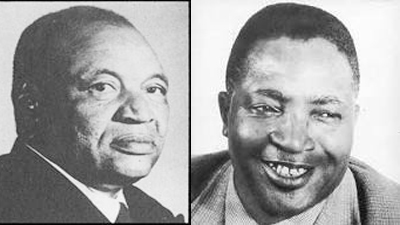The remains of struggle icon Moses Kotane have arrived in Phela village near Rustenburg. Security in Phela Village near Rustenburg has been stepped up in the area. Members of the South African Defence Force, police and other emergency and security services have been deployed to secure the area.
Phela Village is a hive of activity as final preparations are being wrapped up to welcome Moses Kotane’s mortal remains back to his birth place. Moses Kotane’s reburial – which follows the repatriation of his remains from Russian capital, Moscow – will be a Special Official Funeral reserved for distinguished persons specifically designated by the President of the Republic of South Africa.
The small rural village of Pella will be Moses Kotane’s final resting place. He was born a stone’s throw away in Tamposstad in the Rustenburg District of the then-Transvaal in 1905. These humble beginnings did not deter him or his comrade in arms JB Marks, who was born in Venterdorp, as ANC Secretary General Gwede Mantashe describes.
“Organic intellectuals both of them, Moses Kotane did not go very far in formal education but he became the longest serving secretary general of the communist party because when he acknowledged that he learnt better in the party school, night school where he was taught English and how capitalism works and therefore he learnt English and class contradiction at the same time,” says Mantashe.
The comrades embodied the unity of the ANC led alliance with the SACP and the trade union movement today
Kotane’s political life started in earnest in 1928 when he joined the African National Congress and the African Baker’s Union – an affiliate of the New Federation of Non-European Trade Unions. A year later he joined the Communist Party of South Africa. His and Marks’ membership of the three organisations were based on their clear understanding of the political forces the black majority was up against.
Cosatu General Secretary Zwelinzima Vavi says, “They knew and understood that the concrete situation of the South African masses was that they were experiencing racial oppression from a minority and therefore trade unions or communist party in the context of our national democratic could only find their own expression and space in a broader struggle for liberation, and they did this very well as leaders of the ANC, very respected leaders of the communist party and very leaders of the trade union movement.”
Kotane worked diligently in all the institutions of the progressive democratic movement rising to the upper echelons. For SACP Deputy National Chairperson, Thulas Nxesi, he and Marks are the embodiment of all that is best in the hundred year liberation struggle. Theirs, he says was a battle to emancipate the human spirit.
“In their work and lives, the comrades embodied the unity of the ANC led alliance with the SACP and the trade union movement today, it is Cosatu, then it was something else – these comrades were part of what we would call the major international movements of the twentieth century, the struggles against colonialism, the struggles against imperialism, against racism, against fascism, against oppression and exploitation in all its forms.”
Struggle stalwart Winnie Madikizela-Mandela remembers Kotane and Marks well – cooking for them when they visited her home. She too was a member of the ANC and Communist Party, going under the pseudonym of Natasha in the latter organisation. While Kotane’s long service as General Secretary of the Communist Party is the role he is generally most remembered for, Madikizela-Mandela says he and Marks were critical in transforming the ANC into a formidable force.
“They were actually mandated to go to Moscow and sell the idea of nationalism from Russia that is why Russia was our main supporter, that is why we got our weapons from Russia. We were in fact so indebted to the communist party that we were one and the same. They are the architects of the ANC of today,” says Madikizela-Mandela
Kotane was renowned for his clarity of political thought. He combined with his strong conviction in Marxism with a commitment to the goals of nationalism and a firm belief in an African leadership and initiative in the struggle for equal rights. This earned him admiration amongst the staunchest of anti-communists in the ANC.
His reburial on Saturday will be celebrated widely – the testament to a life well-lived. Former President Kgalema Motlanthe puts it most poignantly, ”Nations grow when men and women plant trees even though they know that they will never be able to sit under the shade of those trees.”
Kotane died of a stroke in the then Soviet Union in 1978. The funeral and reburial service for the late former SACP and ANC leader, Moses Kotane, will be held at the Pella Sports Grounds near the Semogodimo Primary School and near the town of Swartruggens, in the North-West on March 14, 2015 from about 09:00 to about 13:30.
– By


